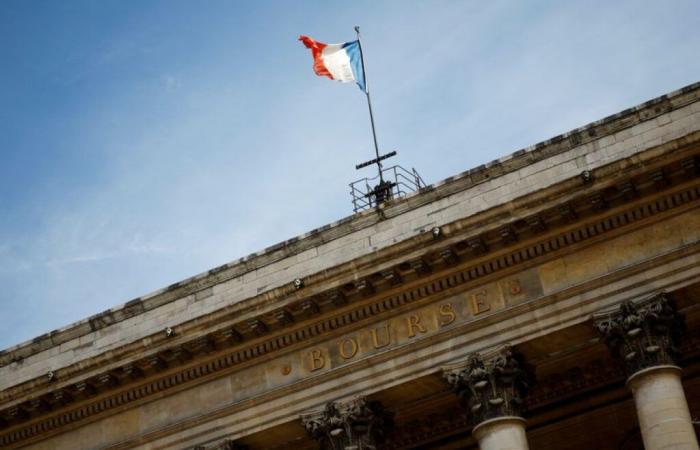A French national flag flies over the Palais Brongniart, the former Paris Stock Exchange
by Bertrand De Meyer
The main European stock markets are expected to rise on Monday, investors showing themselves reassured by the choice of US Treasury Secretary of President-elect Donald Trump.
Futures contracts suggest an opening increase of 0.51% for the CAC 40 in Paris, 0.17% for the FTSE in London, 0.45% for the Dax in Frankfurt and 0.63% for the EuroStoxx 50.
The markets are welcoming the appointment of Scott Bessent, fund manager, as US Treasury Secretary by Donald Trump for his “hawkish” profile and his displayed support for a pro-business policy.
This choice is also reassuring after more heterodox appointments from the elected president, confirming the economic orientations displayed during the campaign around economic policies more favorable to businesses.
In Europe, investors are increasingly betting on an acceleration in the reduction of interest rates from the European Central Bank (ECB) after gloomy PMIs and while inflation in the euro zone for November will be published on Friday.
Philip Lane, chief economist of the ECB, recalled Monday in an interview with the newspaper “Les Echos” that monetary policy should not remain restrictive for too long otherwise there is a risk that the economy will not develop and inflation will fall. below its target.
At the same time, the new German Finance Minister, Joerg Kukies, estimated that a “realistic” reform of the debt brake was possible, raising hopes of a recovery policy in the largest economy in the world. continent.
VALUES TO FOLLOW:
The Italian bank UniCredit, which still hopes to be able to buy its German sister Commerzbank, announced Monday that it was offering 10.09 billion euros according to Reuters calculations to get its hands on its compatriot Banco BPM.
A WALL STREET
The New York Stock Exchange recorded a new increase on Friday, investors worried about an escalation in Ukraine having found some momentum after the publication of an indicator testifying to the solidity of the world's largest economy.
The flash composite PMI rose to a 31-month high in November, boosted by hopes of lower interest rates and more business-friendly policies from President-elect Donald's administration Trump next year.
The Dow Jones index gained 0.97%, or 426.16 points, to 44,296.51 points.
The broader Standard & Poor's 500 gained 20.63 points, or 0.35% to 5,969.34 points.
The Nasdaq Composite advanced 31.23 points, or 0.16%, to 19,003.651 points.
Over the week, all three indices ended in the green, with investors also counting on Donald Trump's program of tax cuts and deregulation to stimulate the American economy.
IN ASIA
The Tokyo Stock Exchange rose sharply on Monday, supported by solid data published in the United States.
The Tokyo Stock Exchange ended up 1.30% while the broader Topix gained 1.02%.
On the contrary, the Chinese stock markets are moving downward due to fears linked to the customs tariffs that Donald Trump wants to impose.
The Hong Kong Hang Seng index declined by 0.2%, the Shanghai SSE Composite fell by 0.19%, the CSI 300 fell by 0.56%.
RATE
Donald Trump's choice to appoint fund manager Scott Bessent as Treasury Secretary is welcomed by the bond market.
The yield on the ten-year Treasury declined by 8.2 bps to 4.3277%, while the yield on the two-year security fell 3.8 bps to 4.3305%.
In Europe, the yield on the German ten-year fell by three basis points to 2.225%, that of the two-year rate was almost unchanged at 2%.
CHANGES
The dollar is losing ground after its recent gains and in the wake of the decline in bond yields.
The dollar fell by 0.58% against a basket of reference currencies, the euro rose by 0.59% to $1.0476, and the pound sterling strengthened by 0.5% to $1.2595.
In Asia, the yen fell 0.23% to 154.38 yen per dollar while the Australian dollar rose 0.18% to 0.6513 dollars.
OIL
The barrel fell on Monday, after an increase of 6% the previous week due to growing tensions between Western powers and the main producing countries, Russia and Iran.
Brent fell by 0.6% to $74.73 per barrel and American light crude (West Texas Intermediate, WTI) weakened by 0.63% to $70.79.
(Written by Bertrand De Meyer, edited by Blandine Hénault)






